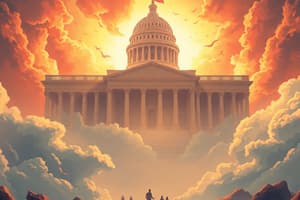Podcast
Questions and Answers
What are some of the topics political theory includes?
What are some of the topics political theory includes?
- Politics, liberty, justice, property, rights, law
- Culture, sexuality, race, wealth, human-nonhuman relations
- Neither Politics, liberty, justice, property, rights, law nor Culture, sexuality, race, wealth, human-nonhuman relations
- Both Politics, liberty, justice, property, rights, law and Culture, sexuality, race, wealth, human-nonhuman relations (correct)
What does political philosophy primarily study?
What does political philosophy primarily study?
- The philosophical study of ethics
- The philosophical study of government (correct)
- The scientific study of culture
- The scientific study of law
What is political science?
What is political science?
- The philosophical study of politics
- The scientific study of government
- The philosophical study of government
- The scientific study of politics (correct)
In which languages is political science used in the plural?
In which languages is political science used in the plural?
What does political theory question about laws?
What does political theory question about laws?
What is considered when determining the legitimacy of a government in political theory?
What is considered when determining the legitimacy of a government in political theory?
In political philosophy, what is questioned about public agents and institutions?
In political philosophy, what is questioned about public agents and institutions?
Which of the following is not typically a topic of political theory?
Which of the following is not typically a topic of political theory?
Which of the following is a topic in political philosophy related to laws?
Which of the following is a topic in political philosophy related to laws?
In what context does political theory explore human-nonhuman relations?
In what context does political theory explore human-nonhuman relations?
Flashcards are hidden until you start studying
Study Notes
Political theory
- Explores fundamental questions about power, justice, freedom, and the nature of the good society
- Examines different forms of government, political institutions, and ideologies
- Analyzes the relationship between individuals and the state
Political philosophy
- Primarily studies foundational questions about politics, such as:
- The nature of justice
- The justification of political authority
- The role of government
- The relationship between individual rights and collective interests
- The meaning of freedom and equality
Political science
- Studies the practice and theory of politics
- Employs systematic methods of inquiry, including empirical research, to understand political phenomena
- Seeks to explain and predict political behavior, institutions, and processes
- Uses quantitative and qualitative methods to investigate political issues
Plural languages
- Political science is used in the plural in languages such as French (les sciences politiques), Spanish (las ciencias políticas), and Italian (le scienze politiche)
Political theory questions about laws
- Question the nature of laws, including:
- Whether laws are based on natural law or positive law
- Whether laws are inherently just or merely reflect the will of the powerful
- Whether laws should be applied universally or take into account specific circumstances
- Whether laws are created through rational processes or shaped by cultural norms and values
Political theory and the legitimacy of government
- Examines what makes a government legitimate, considering factors such as:
- The consent of the governed
- The rule of law
- The protection of individual rights
- The effectiveness in achieving its goals
- The ability to respond to the needs of its citizens
Political philosophy questions about agents and institutions
- Questions the nature and purpose of public agents and institutions, including:
- Their role in shaping individual behavior
- Their legitimacy in making decisions that affect the lives of citizens
- The moral constraints on their actions
- The accountability of those in power
Non-traditional political theory topics
- Non-traditional topics in political theory include:
- The relationship between politics and the environment
- The ethics of technology
- The impact of globalization on political institutions
- The role of gender in politics
- The implications of artificial intelligence for the future of democracy
Political philosophy and laws
- Political philosophy examines the relationship between law and morality, specifically:
- Whether laws should reflect moral principles
- Whether laws should be interpreted in accordance with moral values
- Whether laws can be justified on grounds other than morality, such as social utility or custom
Political theory and human-nonhuman relations
- Explores the political implications of human interactions with non-human entities, considering:
- Animal rights and the place of animals in political thought
- The ethics of environmental policy and the treatment of the natural world
- The impact of climate change on social justice and political stability
Studying That Suits You
Use AI to generate personalized quizzes and flashcards to suit your learning preferences.




